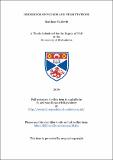Files in this item
Orderings on words and permutations
Item metadata
| dc.contributor.advisor | Ruškuc, Nik | |
| dc.contributor.author | McDevitt, Matthew | |
| dc.coverage.spatial | xii, 157 p. | en_US |
| dc.date.accessioned | 2019-09-11T15:45:33Z | |
| dc.date.available | 2019-09-11T15:45:33Z | |
| dc.date.issued | 2019-12-03 | |
| dc.identifier.uri | https://hdl.handle.net/10023/18465 | |
| dc.description.abstract | Substructure orderings are ubiquitous throughout combinatorics and all of mathematics. In this thesis we consider various orderings on words, as well as the consecutive involvement ordering on permutations. Throughout there will be a focus on deciding certain order-theoretic properties, primarily the properties of being well-quasi-ordered (WQO) and of being atomic. In Chapter 1, we establish the background material required for the remainder of the thesis. This will include concepts from order theory, formal language theory, automata theory, and the theory of permutations. We also introduce various orderings on words, and the consecutive involvement ordering on permutations. In Chapter 2, we consider the prefix, suffix and factor orderings on words. For the prefix and suffix orderings, we give a characterisation of the regular languages which are WQO, and of those which are atomic. We then consider the factor ordering and show that the atomicity is decidable for finitely-based sets. We also give a new proof that WQO is decidable for finitely-based sets, which is a special case of a result of Atminas et al. In Chapters 3 and 4, we consider some general families of orderings on words. In Chapter 3 we consider orderings on words which are rational, meaning that they can be generated by transducers. We discuss the class of insertion relations introduced in a paper by the author, and introduce a generalisation. In Chapter 4, we consider three other variations of orderings on words. Throughout these chapters we prove various decidability results. In Chapter 5, we consider the consecutive involvement on permutations. We generalise our results for the factor ordering on words to show that WQO and atomicity are decidable. Through this investigation we answer some questions which have been asked (and remain open) for the involvement on permutations. | en_US |
| dc.language.iso | en | en_US |
| dc.publisher | University of St Andrews | |
| dc.subject.lcc | QA171.48M3 | |
| dc.subject.lcsh | Ordered sets | en |
| dc.subject.lcsh | Combinatorial analysis | en |
| dc.subject.lcsh | Permutations | en |
| dc.title | Orderings on words and permutations | en_US |
| dc.type | Thesis | en_US |
| dc.contributor.sponsor | Engineering and Physical Sciences Research Council (EPSRC) | en_US |
| dc.type.qualificationlevel | Doctoral | en_US |
| dc.type.qualificationname | PhD Doctor of Philosophy | en_US |
| dc.publisher.institution | The University of St Andrews | en_US |
This item appears in the following Collection(s)
Items in the St Andrews Research Repository are protected by copyright, with all rights reserved, unless otherwise indicated.

